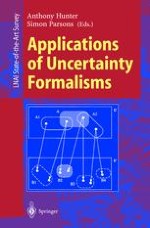1998 | OriginalPaper | Chapter
How much does an agent believe: an extension of modal epistemic logic
Author : Subrata K. Das
Published in: Applications of Uncertainty Formalisms
Publisher: Springer Berlin Heidelberg
Included in: Professional Book Archive
Activate our intelligent search to find suitable subject content or patents.
Select sections of text to find matching patents with Artificial Intelligence. powered by
Select sections of text to find additional relevant content using AI-assisted search. powered by
Modal logics are often criticised for their coarse grain representation of knowledge of possibilities about assertions. That is to say, if two assertions are possible in the current world, their further properties are indistinguishable in the modal formalism even if an agent knows that one of them is true in twice as many possible worlds as compared to the other one. Epistemic logic, that is the logic of knowledge and belief, cannot avoid this shortcomings because it inherits the syntax and semantics of modal logics. In this paper, we develop an extended formalism of modal epistemic logic which will allow an agent to represent its degrees of support about an assertion. The degrees are drawn from qualitative or quantitative dictionaries which are accumulated from agent’s a priori knowledge about the application domain. A possible-world semantics of the logic is developed by using the accessibility hyperelation and the soundness and completeness results are stated. The abstract syntax and semantics are illustrated and motivated by an example from the medical domain.
